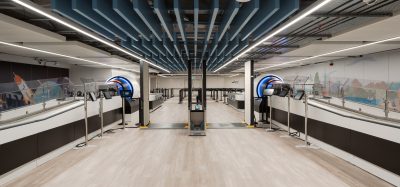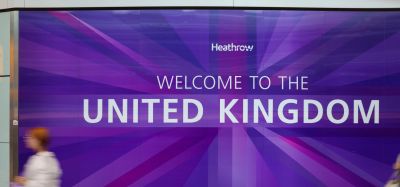Staff Development Programme (SDP)
- Like
- Digg
- Del
- Tumblr
- VKontakte
- Buffer
- Love This
- Odnoklassniki
- Meneame
- Blogger
- Amazon
- Yahoo Mail
- Gmail
- AOL
- Newsvine
- HackerNews
- Evernote
- MySpace
- Mail.ru
- Viadeo
- Line
- Comments
- Yummly
- SMS
- Viber
- Telegram
- Subscribe
- Skype
- Facebook Messenger
- Kakao
- LiveJournal
- Yammer
- Edgar
- Fintel
- Mix
- Instapaper
- Copy Link
Posted: 17 August 2018 | Gordon Griffiths | No comments yet
While airport capacity continues its ever-increasing surge, Airport Operations Consultant, Gordon Griffiths, believes that if staff are not trained to cope with the numbers of passenger, and the trials and tribulations that go together with it, creating brand-new terminals will not help to ease the strain of the current infrastructure of the system. He gives his insight into the staff development programme to aid with staff training.


Industry background
The passenger growth of the aviation industry is predicted to double within the next 14 years, to seven and a half billion. World class airports can expect to witness continuous and substantial incremental passenger growth, as well as the necessity for additional/expanded infrastructure to cater for the increased demand.
Examples include, but are not limited to: terminal, cargo, passenger numbers, transfer/transit, aircraft movements, extended periods of peak operations and congestion becoming the standard 24/7.
Management
A new terminal would facilitate the increase of capacity to move to a higher league of operations and intensity which in this congested airspace is essential. However, despite the need for larger terminals, it is paramount that staff undergo training and development to maintain the reputation of the airport as a world class facility. Staff need comprehensive training in being able to effectively meet role requirements and, in times of need, respond in a decisive manner. In doing so they are protecting the interest of the organisation.
In the likely event of disruption, an ineffective response will expose the airport to criticism, potential litigation and adverse publicity; smearing the airport’s reputation both locally and globally. This will alert the licensing authority who will pay meticulous attention to the airport operation and who have the authority to impose sanctions.
It is incumbent for senior management to recognise this by having in a management structure that is qualified, trained and supported by experienced staff who can work under severe pressure. The staff network equally needs to be able to react in this fast-moving environment from a theoretical approach to a realistic approach. A full understanding of their responsibilities, cognisant of regulatory requirements and the ability to meet stakeholders’ and passengers’ expectations is vital.
Furthermore, to maintain a safe operation it is paramount to operate to an acceptable level of safety and wherever possible exceed the minimum requirements. To deliver this expectation, staff development should be reviewed with an understanding that training is necessary for individuals in the organisation to achieve excellence in their roles, by being effective and in doing so, developing individuals who have gained knowledge and training, providing them with the credentials to assume greater responsibilities.
Staff Training Programme
Hypothetically, the working practices, technology and systems of an old terminal facility, which met the level of operation at the time, have now often been superseded with a new terminal, which encapsulates the needs of air travel in the current day and age. The new facility justifies a new approach.
An effective staff development programme aims to enable staff to gain increased satisfaction from work and develop individual careers through enhanced qualifications. Such an approach has proven to help staff develop their skills, knowledge and aptitudes necessary to make a more effective contribution to the organisation and instils within them a sense of recognition, achievement and job satisfaction.
Existing staff should be assessed to determine their background and aptitude in being able to deliver what is expected. Any shortfall should be addressed and supported with an organised and structured training and development programme.
In the case of a new terminal facility development, airport management figures need to move away from the approaches of the past and think dynamically. It is detrimental to any organisation to operate and dismiss required procedures to deliver the highest level of safety and in meeting the increasing expectations of stakeholder and the travelling public.
Undoubtedly, a substantial element of improvement is and will be delivered through the new technology and infrastructure of any airport system. However, it takes the ability of trained staff at all levels to deliver a quality operation that oversees and complements the new facility. This attitude should run linear to growth in maintaining, and where possible exceeding, minimum standards.
Failure to do so, will result in an ineffective airport operation that is plagued with non-compliance in all areas such as safety and quality. Passenger service quality results will gradually decline with the potential for stagnation in growth. It is imperative for all airport operators to have the right people, in the right roles, delivering the right quality of service.
Historical evidence concludes that safety concerns will continue to be at the forefront of airport safety development. This is integral to airport safety, with potentially serious consequences, dissatisfaction from stakeholders, regulator relationships impaired, with the image and reputation of the airport compromised.
This article aims to divulge situations that have prevailed at global airports due to inadequate and poorly trained airport staff. Staff sometimes start at entry level and progress to supervisor, manager, senior manager and executive management levels.
The renowned airport management structure should be subject to a complete review to ensure the structure is sound and able to meet the current demand, with the ability of adapting to the future. Ensuring that those employed are best suited and have been subjected to an appropriate level of training and development commensurate for the roles they perform.
It is furthermore essential for Senior and Executive management to be fully aware of the roles they perform, recognising the responsibility and accountability they will be held responsible for in the event of a safety related event occurring. It is permissible to delegate responsibility but cannot abdicate accountability.
Purpose
The programme, proposed by Griffiths, is to deliver the enhancement and enrichment of each member of staff through organisation, job and personal development. The programme seeks to provide learning opportunities for all staff so that by performing their individual jobs effectively, they can contribute to an airport’s individual missions, visions and values.
Staff development and training as a planned and structured activity is designed to help an individual or a group of people to achieve quality of performance and service. Staff development and training process uses organisational structures and procedures to facilitate learning.
The creation of a training programme and the success thereof of an individual airport, is to ensure the instructor, tasked with the training, is suitably qualified and has an extensive background in airport operations, gained from ground level exposure through the operations and management structure. It requires a passion in the delivery of modules that seeks to bring realism and inspires staff to grasp the opportunity for career development.
Objectives
This programme can be implemented throughout a wide range of airport models, but the objectives should remain the same – to achieve an effective staff development and training programme:
- To monitor and maintain clear staff recruitment and selection procedures ensuring equality of opportunity in employment.
- To provide a comprehensive induction procedure for new staff.
- To develop, maintain and monitor structures and systems providing management, support and evaluation for all staff.
- To maintain staff development and training records for each member of staff.
- To evaluate the impact of development and training on the individual’s work and ultimately the performance of the organisation.
Benefits
- Individuals improved performance and attendance
- Job satisfaction
- Reduction in staff turnover
- Maintains the airports reputation in delivering a world class service
- Promotes the airport as a place where people aspire to work
- Ensures safety is paramount and is the number one priority.
Biography
Gordon Griffiths has worked within the airport operations industry for over 40 years and has undertaken numerous roles in airports across the globe during that time. Some of his previous positions have included Head of Airport Operations Compliance, Head of Airport Development, Customer Services Director and Head of Airside Delivery. Gordon is currently an Airport Operations Consultant focusing to change management and the continuous improvement of safety standards. He is retained by IATA, ACI and GCAS as an External Aviation SME Instructor in airport and airline operations and conducts courses across the globe.


















